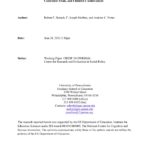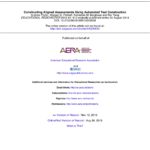Featured Research Reports

Golfing in a Hurricane: Education System Instability, Randomized Controlled Trials, and Children’s Achievement
Authors: Robert F. Boruch, Andrew C. Porter (University of Pennsylvania), and F. Joseph Merlino (The 21st Century Partnership for STEM Education)
This report summarizes and extends ideas that have emerged from a large-scale cluster randomized trial on improvements to science curriculum for middle school children. We focus on instability in four school districts in which the trial was mounted, the implications for mounting further trials, and some implications beyond trials. The report expands on a commentary developed by Boruch, Merlino, and Porter (2012) for Education Week.

Constructing Aligned Assessments Using Automated Test Construction
Authors: Andrew Porter (University of Pennsylvania), Morgan S. Polikoff (University of Southern California), Katherine M. Barghaus and Rui Yang (University of Pennsylvania)
We describe an innovative automated test construction algorithm for building aligned achievement tests. by incorporating the algorithm into the test construction process, along with other test construction procedures for building reliable and unbiased assessments, the result is much more valid tests than result from current test construction practices. The test construction process is efficient and versatile in its application. The target domain could be state content standards, a particular curriculum, or even an intervention. The algorithm, which draws on Surveys of Enacted Curriculum (SEC) procedures, can be employed in the context of English language arts and reading, mathematics, or science. We demonstrate the algorithm’s use and benefits for constructing tests, guiding item riting, and creating subtests from an existing test such that the subtests.
The Center has produced several materials related to science curriculum, teacher professional development, improving student achievement, and research process issues. These materials include research reports, professional conference presentations, and other products, several of which are posted in a format for free downloading in this section.
American Education Research Association (AERA) 2010
Translational Science of Cognitive Science in Middle School Science Curricula
Authors: Christian D. Schunn (University of Pittsburgh: Pittsburgh, PA), F. Joseph Merlino (The 21st Century Partnerhip for STEM Education), Jennifer G. Cromley (Temple University: Philadelphia, PA), Christine M. Massey (University of Pennsylvania: Philadelphia, PA), Nora Newcombe (Temple University: Philadelphia, PA) and Timothy J. Nokes (University of Pittsburgh: Pittsburgh, PA) (Download this presentation)
Designing a Mixed-Methods Evaluation to Measure the Impacts of Modified Middle School Science Curricula
Authors: Morgan S. Polikoff, Rebecca A. Maynard and Robert Boruch (University of Pennsylvania: Philadelphia, PA)
This paper begins by laying out the foundational conditions that shaped the impact evaluation design and discussing their implications for designing the study sample and data collection plan. It then proceeds to a discussion of the sample and timeline of the parallel randomized trials. Finally, the planned analytical strategies are discussed. (Download this presentation)
American Education Research Association (AERA) 2011
Teaching Middle School Students to Reason With Visual Representations in Science
Authors: Jennifer G. Cromley, Nora Newcombe, Theodore W. Wills, Melanie Wills, Melissa Karakus and Michael Batchelor (Temple University: Philadelphia, PA)
As part of the 21st Century National Center on Cognition and Science Instruction, 3 textbooks/modules each were modified from both traditional and inquiry-based middle-school science curricula, using principles regarding reasoning with diagrams and other visual representations. Why and how the 6 curricular units were modified is described. (Download this presentation)
American Psychological Society (APS) 2011
Contrasting Cases Can Facilitate Hands-on Middle School Science Learning at Scale
Authors: Christian D. Schunn, J. Elizabeth Richey and Louis Alfieri (University of Pittsburgh: Pittsburgh, PA)
Contrasting cases were added to the beginning of extended investigations in an existing hands-on, month-long middle school science unit. A large-scale field experiment assessed student learning and found improved learning outcomes for the following: Focal concepts in the cases, material that built up on the cases, and broader concepts from the unit. (Download this presentation)
Comparative Cognition Sociey (CCS) 2010
Using Analogical Learning in Science Curricula to Improve Conceptual Understanding
Authors: J. Elizabeth Richey, Alicia Chang, Timothy J. Nokes, Christian D. Schunn (University of Pittsburg, Pittsburgh, PA) (Download this presentation)
Institute of Education Sciences (IES) 2009
Cognitive Science Applied to Middle School Science Curricula
Authors: Christian D. Schunn (University of Pittsburgh: Pittsburgh, PA), Christine M. Massey (University of Pennsylvania: Philadelphia, PA), Nora Newcombe and Jennifer G. Cromley (Temple University: Philadelphia, PA) (Download this presentation)
Institute of Education Sciences (IES) 2010
Improving Diagrammatic Reasoning in Middle School Science Students
Authors: Jennifer G. Cromley, Nora Newcombe (Temple University: Philadelphia, PA), Christian D. Schunn (University of Pittsburgh: Pittsburgh, PA) and Christine M. Massey (University of Pennsylvania: Philadelphia, PA)
Middle school students who completed an 11-week diagrams interventions showed greater achievement in content and in transfer of diagrammatic reasoning that did students in no-treatment control groups. (Download this presentation)
Institute of Education Sciences (IES) 2011
Introduction to CaSE
Authors: Christian D. Schunn (University of Pittsburgh: Pittsburgh, PA) and Christine M. Massey (University of Pennsylvania: Philadelphia, PA) (Download this presentation)
National Science Foundation (NSF) -OECD 2012
Increasing Spatial Learning in Formal and Informal Settings
Authors: Nora S. Newcombe (Temple University: Philadelphia, PA) (Download this presentation)
National Science Teachers Association (NSTA) 2012
Middle School Biology and Geology: Increasing Student Learning Through Increasing Teacher Content Knowledge
Author: Bates Mandel and Susan Holmes (The 21st Century Partnership for STEM Education: Conshohocken, PA)
In these presentation, the authors review the structure of an upcoming study designed to answer the following questions:
1. Does deepening teachers’ knowledge of the science they are teaching lead to increased student achievement?
2. Does giving teachers science unit materials modified using cognitive principles and providing professional development on how to implement the modifications lead to increased student achievement?
The studies will be conducted in large urban middle school geology and biology courses using commercially available curriculum.
Download the PowerPoint Presentations:
Download Biology Presentation
Download Geology Presentation
Cognitive Science Learning Principles in Action: Visualization
Authors: Nora S. Newcombe (Temple University: Philadelphia, PA)
Teaching students to decode Visualizations is a cognitive science, research-based learning principle that increases student learning in science. Find out how to embed it in your teaching! (Download this presentation)
Using Cognitive Science to Improve Science Learning
Author: Donna Cleland (The 21st Century Partnership for STEM Education: Conshohocken, PA)
This PowerPoint presentation is from a NSTA session that engaged participants in four research-based cognitive science learning principles and how to embed them in existing science curricula. After experiencing learning science through activities using these principles, participants developed similar modifications for their own science materials. (Download this presentation)
Conceptual Learning Challenges in Learning Progressions: Their use in Spaced Assessment
Author: Christine M. Massey (University of Pennsylvania: Philadelphia, PA)
Using Spaced Assessment is a cognitive science, research-based learning principle that increases student retention. During this NSTA presentation Christine Massey examined formative assessment practices that can help teachers understand what their students have "MIS"understood. (Download this presentation)
More Best Practices
Author: Donna P. Cleland (The 21st Century Partnership for STEM Education: Conshohocken, PA)
In this session, the Center shared seven cognitive science based recommendations for organizing instruction to improve student learning. The presentation also include a brief overview of related research and strategies for classroom implementation. (Download this presentation)
PSA 2009
Using Cognitive Science to Improve Middle School Science Learning
Authors: Alicia Chang, Timothy J. Nokes and Christian D. Schunn (University of Pittsburgh: Pittsburgh, PA) (Download this presentation)
Society for Research on Educational Effectiveness (SREE) 2011
Using Research on Analogical Reasoning, Diagrammatic Reasoning, and Prior Knowledge to Improve Middle School Science Outcomes
Authors: Nora S. Newcombe (Temple University: Philadelphia, PA)
There have often been complaints about the lack of implementation of basic research findings from cognitive science into curricula. We are conducting a large research study to examine whether systematic modification of middle school science curricula using general cognitive science principles can significantly improve student learning in large urban school districts. A team of cognitive scientists is collaborating to systematically modify 3 curriculum units in common textbook for teaching science and 3 curriculum units in a common hands-on science curriculum. The modifications are based primarily on four main principles derived from cognitive science research: contrasting cases setup instruction, visualization conventions and challenges need to be explicitly address in instruction, instruction must build upon and address student prior knowledge, and spaced testing improves retention. We describe the foundations of these principles and provide examples of how these principles were used to modify the science curricula. This study presents an opportunity to test the cumulative benefit of basic cognitive science research applies to science education rather than just laboratory demonstrations. (Download this presentation)
Western Psychological Association (WPA) 2010
Scaffolding Middle School Science Learning with Contrasting Cases
Authors: Alicia Chang, Timothy J. Nokes and Christian D. Schunn (University of Pittsburgh: Pittsburgh, PA) (Download this presentation)
Approximately 180 schools and over 500 classroom teachers were recruited from two school districts in Pennsylvania and five districts in Arizona; one Pennsylvania district used the Holt materials, while the Arizona districts and the other Pennsylvania district used FOSS. These teachers were divided randomly into three treatment conditions. In the Cognitive Science treatment arm, teachers received the modified curriculum units and professional development on how to implement them. In the Science Content treatment arm, teachers received professional development to enhance their science knowledge pertaining to the particular science unit they were teaching. This arm neither received the modified curriculum nor any pedagogical guidance. The Control treatment teachers received no special support and presumably continued to teach in their normal way. Numerous related questions were also explored in the Center studies. Higher-level statistical models were used.
Videos of conference sessions on the study findings and implications, plus closing remarks are listed and linked in the side panel of this page.